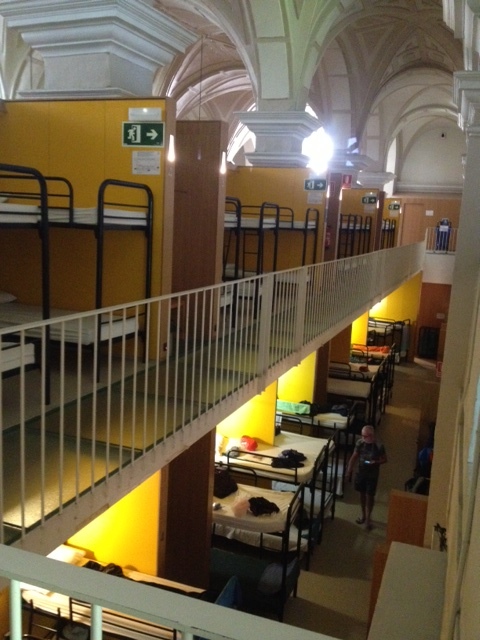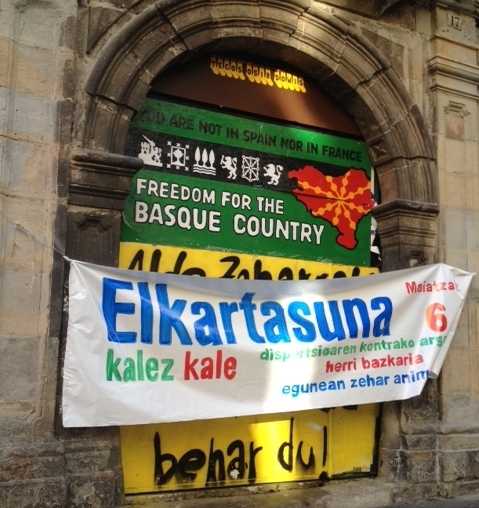Camino Day 5: Uterga, after Pamplona, and blister treatment at the mercy of strangers
/The village of Uterga, 16 km past Pamplona
At the moment its 22:30 pm and I'm on a couch in a small hostel in Uterga, Spain, not remotely tired because I dozed for quite a few hours earlier this evening. I thought I wasn't a napper. Then I lucked out and got a top bunk right by an open window, with a breeze flowing through in the heat of the day... and with a view of other sweaty pilgrims passing through on the Camino directly outside (still walking, which should have made me feel lazy), I kicked off my shoes and fell asleep.
Pamplona was crazy last night. Apparently they'd just won some sort of soccer game. All night long the streets were packed with revelers and tubas blasting and marching bands leading cheering hordes of people up and down the narrow streets. After reaching the Pamplona municipal albergue, I re-bandaged my blisters and put on my flats and limped out- gingerly - to find an ATM, and a shop with better woolen socks. I had no choice. I needed money, and I needed socks. But being in the midst of a city-wide party, I felt nervous for the first time since arriving in Spain alone, because I realized - suddenly and painfully - that if necessary, I did not think I could run. So rarely in my life have I felt like a cripple. Once with a sprained ankle; once with stitches in my foot. Both times it was humbling. Now? These are only stinging blisters, just a flesh wound, just an inconvenience. But it's made me realize, all over again, how lucky it is to be able-bodied and able to walk without pain.
Just to be able to walk. So many pilgrims here are elderly, with arthritis, and chronic pain. In truth I should be grateful.
The municipal albergue in Pamplona was rather incredible, design-wise. It made me think of so many architecture lessons in adaptive reuse and historic preservation; I limped around staring and drooling, admiring their retrofit. The 'Jesus y Maria' municipal albergue is inside an old church building, near the Pamplona cathedral. There are vaulted ceilings and echoing halls. But the designers added colored partitions and bunks, and made it all into a two-level sleeping space, with glass catwalks on the second level so you could see people's feet passing on the floor above while you were sleeping:
Jesus y Maria municipal albergue, Pamplona
So cool! That photo was around 2 pm, before they ran out of beds at 5 pm. It sleeps 114. And boy did it echo, with all those hard surfaces. It was like an orchestra of snores. Even I used earplugs.
The view from beside my bunk, number 49:
8 euros for the night!
On the way out of Pamplona this morning, there were patriotic banners for the Basque country on the doors:
Partially in English? I don't know why. A mere publicity stunt? But the Basque language itself is incredible, with crazy spelling, and just as crazy pronunciation (what little I've heard). The compactness of all these cultural regions is shocking. Coming from America - Montana in particular, where you can drive hundreds of miles without passing a town, or even a cow - it's surreal how close together such diverse languages can be. After only 5 days of walking we've already passed from the French-language Pyrenees all the way through Basque. Basque is 'Euskerra,' in their own language.
I think today I walked through the exact photo on the cover of the guidebook - a dusty track leading through yellow and green fields:
Up to a hill crested with windmills, rows and rows of them stretching like white sentinels in both directions. Yesterday I learned from a Spanish girl that windmill is 'molina de viento', and she referenced the Don Quixote windmill scene. I learned that Catalan is its own separate language, which she speaks... and then after her I walked with a Ukrainian woman for the last stretch to Pamplona, and spent 4 km trying to learn phrases in Ukrainian. Her boyfriend is walking the Northern Camino route while she walks this one, and they're meeting at the cathedral in Santigo (so romantic). She spoke very little english or spanish and had not met a single other Ukrainian or Russian as she walked alone. (So brave).
Hearing her story was an excellent distraction from blisters. Today I walked a while with a German girl who suggested threading a thread through the blister - like, with a needle - so when you walk the thread helps all the fluid drain out. I told her that sounded like serious surgery, though I do have a sewing kit; we'll see how desperate I become. Anyway, then we reached this ridge of windmills, and pilgrim sculptures to commemorate the climb:
Complete with plenty of real-life pilgrims lounging and taking in the view. The path itself was mild and meandering and not too steep; mostly, it's just hot.
There were literal heat waves coming up off the fields approaching Uterga. The whole town looked like a mirage.
Now, while walking away from Pamplona - while eating fruit, and stopping at wayside cemeteries, and listening to music, and enjoying the view - I had been thinking in the back of my mind, 'if Grandma was here, she'd tell me to soak my feet in Epsom salts.' Something to make the skin harden and turn those blisters into calluses fast. Then, lo and behold, when I stopped at this small Uterga albergue and told the owner I had blisters, he said he had 'la solucion!' and told me to go wait in the garden. He brought out a tub of steaming water with salt, and a carefully folded towel, and looked quite pleased when I told him my grandma would have recommended this too.
It's amazing how hard kindness hits you, when you finally admit you need help, and it comes from a stranger. I almost sobbed.
Perhaps it's just being vulnerable. I'm not used to feeling vulnerable, but these blisters so soon, with the long road ahead, have done it. I feel ripped open and raw and at the mercy of others, and lying here tonight - having encountered only kindness - I'm left with overwhelming gratitude for this small hostel owner who gave me steaming saltwater and asked for nothing, and kept me safe all afternoon in the shade of his garden.
Buen camino, and may you always find the help you need when you need it most.
-mlj







